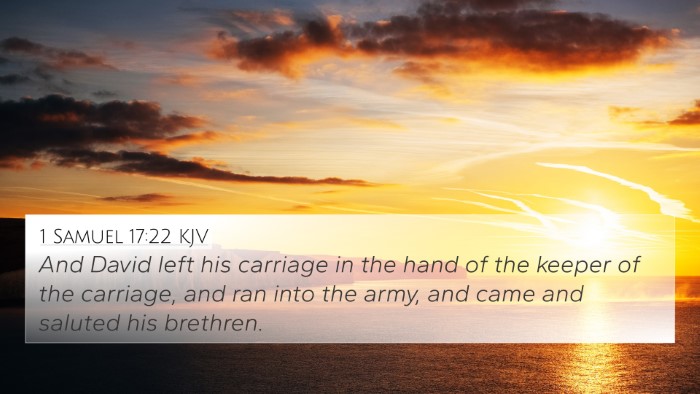Understanding 1 Samuel 25:5
Verse: "And David sent out ten young men, and David said unto the young men, Get you up to Carmel, and go to Nabal, and greet him in my name." (1 Samuel 25:5)
Contextual Background
In the narrative of 1 Samuel, we find David in exile, fleeing from King Saul. During this time, he encounters Nabal, a wealthy yet harsh man. This incident serves as a significant lesson in leadership, humility, and the nature of responses to wrongdoing.
Verse Meaning: A Synthesis of Insights
This verse illustrates David's diplomatic approach in seeking support from Nabal. Using insights from public domain commentaries, we can glean the following meanings:
-
Matthew Henry:
Henry remarks that David, recognizing his position and needs, carefully chooses to engage with Nabal. David's request for provisions was not merely for personal use but indicated his respect and need for relational connection during his time of hardship.
-
Albert Barnes:
Barnes emphasizes the social customs of the time. David's greeting was aligned with the expected protocols of hospitality, which further highlights Nabal's impending failure to respond appropriately, reflecting on his character.
-
Adam Clarke:
Clarke notes that sending young men with a greeting served as a respectful introduction, showing David’s intention to approach the matter with civility, remembering that his reputation was based on honorable dealings.
Thematic Connections
This verse serves as a pivotal moment in a larger narrative, establishing themes of:
- Leadership and Conflict Resolution
- Hospitality and Human Relationship
- Wealth and Moral Character
Cross-References
1 Samuel 25:5 can be linked to several other scriptures, exemplifying connections between Bible verses:
- Proverbs 18:16: "A man's gift maketh room for him, and bringeth him before great men."
- Luke 10:7: "And in the same house remain, eating and drinking such things as they give: for the laborer is worthy of his hire..."
- Matthew 5:9: "Blessed are the peacemakers: for they shall be called the children of God."
- 2 Samuel 2:1: "And it came to pass after this, that David enquired of the Lord, saying, Shall I go up into any of the cities of Judah?"
- Romans 12:18: "If it be possible, as much as lieth in you, live peaceably with all men."
- 1 Peter 3:9: "Not rendering evil for evil, or railing for railing: but contrariwise blessing..."
- James 1:19: "Wherefore, my beloved brethren, let every man be swift to hear, slow to speak, slow to wrath."
Lessons Learned
This incident, capturing David's approach to Nabal, provides rich lessons in human interaction and ministry:
- **Seek Peace:** David exemplifies the importance of seeking peace before conflict.
- **Exercise Wisdom in Relationships:** Understanding social dynamics is vital in leadership and diplomacy.
- **Character Over Wealth:** The eventual fallout with Nabal showcases that wealth does not equate to moral integrity.
Practical Applications
For the modern believer, 1 Samuel 25:5 serves as a reminder of how to approach difficult situations:
- **Utilize Tools for Bible Cross-Referencing:** Dive deeper into scriptures that connect with David's story, illuminating new insights.
- **Engage in Cross-Reference Bible Study:** Explore how themes of kindness and wisdom resonate throughout the scriptures.
- **Understand Inter-Biblical Dialogue:** Identifying connections between Old and New Testament teachings can enhance understanding and application of biblical principles.
Conclusion
In summary, 1 Samuel 25:5 is not merely a narrative detail; it is a foundational lesson in the philosophy of leadership, humility, and the consequences of social choices. Through comparative Bible verse analysis and thematic connections, believers can deepen their understanding and application of biblical principles relevant to their lives today.




